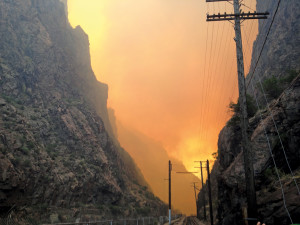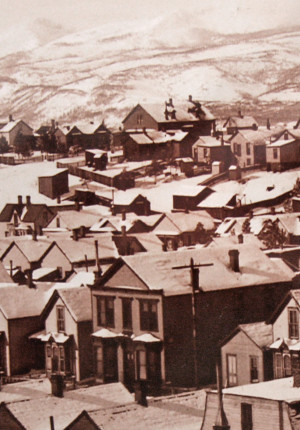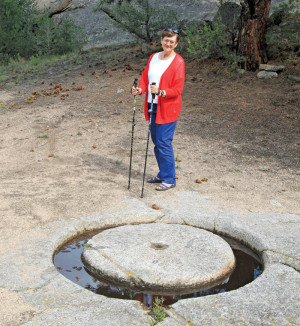By George Sibley
I started writing this a couple days after Memorial Day – the beginning of “the patriot season.” Memorial Day, followed by Flag Day which is now past, with Independence Day on the horizon; the patriot season.
The patriot season began for me this year a couple days before Memorial Day. Every Friday afternoon, a group of musicians and singers assembles in random combinations down at Gunnison’s “living care center,” where we do an unrehearsed combination concert and group sing with the old folk biding their final time there. Many of the folks, unfortunately, no longer know who they are, but they still remember the words to the kinds of songs people used to sing to and for each other around the family piano, before capitalist entrepreneurs took over the task of entertaining us more professionally.
Anyway, that Friday in May, in honor of Memorial Day, we sang “America the Beautiful.” It had been awhile since I’d sung that song – but I was barely to the “amber waves of grain” when I again thought how much I wished that song was our national anthem. (It has been awhile since I actually sang the national anthem too, but that is because we have slipped into the habit of just standing there while professionals sing it for us, turning it into a personal aria while we perform our apparent national function of passive audience.)
But I sang “America the Beautiful” this year – against the backdrop of our direct involvement in half a dozen of the kind of “foreign entanglements” that George Washington warned us against; with new daily revelations about how thoroughly plutocratic our alleged democracy has become, and new daily revelations about the creeping surveillance net the federal government is wrapping around us, and the ongoing accumulating evidence that our government is now totally unable to do anything actually constructive. Against that backdrop, I found myself nearly overcome, throat closing up, especially when we got to that incredible stanza:
“America! America! God mend thine ev’ry flaw,
Confirm thy soul in self-control, Thy liberty in law.”
Has anyone ever written a more concise and accurate prescription for what we need today? “Confirm thy soul in self-control.” Wow.*
I was struck anew by how thoughtful – how full of thought – the song is. It wasn’t really written as a song; it was a poem that was later set to music – a poem of both praise and critique, of rejoicing in what we’re blessed with, and making it better.
The quality of the poetry probably stems from the fact that the poet, Katharine Lee Bates, was also a professor of English at Wellesley College, one of the “Seven Sisters”: colleges created in the 19th century to give young women of privilege access to the same kind of education that their brothers were getting at Ivy League schools.
* This stanza was not in Ms. Bates’ first iteration of her “Poem for July 4”; it apparently came along later when she was adapting it for Samuel Ward’s music.
Both sets of colleges made no apology for the fact that they recruited from the well-off families of America; they saw their mission as inspiring in those privileged sons and daughters a sense of serious service to the society that enabled their well-being.
Realistically, of course, the patriarchal and testosterone-driven political and economic society of the postbellum 19th century, driving toward the First Gilded Age (we’re now in the Second), had no room at the top for the Seven Sisters graduates. They were given the tasks of teaching the children and doing what could be done (short of sharing the wealth) to keep the poor in spirit and body from reaching the dangerous point of having nothing left to lose. That was the official division of labor, anyway, for the well-off and well-educated women. On their own, a lot of those women applied their educations to making trouble – advocating for the right to vote, for the right to birth control, and for controls on liquor in a sloshed society, where men routinely began their day with a pick-me-up and the hair of the dog.
By the time Professor Bates’ poem was wedded to church organist Samuel Ward’s music early in the 20th century (1910), America seemed to be bifurcating into two Americas – a division reflected in the spirits cultivated in those two sets of colleges, as reflected in their “anthems.” One America: the dominant nation-state America shaped by the generations of Ivy League graduates, all of whom evidently march to the militant “Star-Spangled Banner,” and who have successfully imposed an aggressive, power-bent realpolitik on the planet. “Control,” to these Americans, has nothing to do with “self” but with what can be imposed over everyone and everything else under the guise of war on everyone and everything not yet “under control.” Terror, drugs, communism, cancer, et cetera, et cetera.
Then the other America: the “recessive,” unrealized America given voice by Katharine Bates. Her “patriot dream” with its fruited plains and alabaster cities was a “country” rather than a nation-state – an idealistic America, the “kinder, gentler America” that might have been Barbara Bush’s soundbite contribution to her otherwise stolidly Ivy League dynasty. Too idealistic to even think about trying out? It is to the other America which now controls with power and wealth all the politics and economies that would have to be transformed to that patriot dream, so the question is moot.
This does raise another question, however, here in patriot season, about who or what a “patriot” is. It’s a word that often gets waved around like a weapon. We seem to be increasingly driven – here in the “homeland” as well as globally – by a “PATRIOT Act”; no one remembers the word salad that acronym stood for, but it did its job. A dark law cobbled together in a moment of extreme fear and anger is now defining “patriotism” for all Americans. Is it patriotic to unquestioningly obey the “Patriot Act”? It’s a question I ask myself every time I have to take off my shoes and belt and shuffle through a scanner at the airport. I, of course, know better than to ask it out loud.
But this patriot season, two young men have shamed equivocators like myself by making that something more than an abstract question. Are Bradley Manning and Edward Snowden patriots or traitors? Under the Patriot Act, the answer seems clear enough, and the federal government has set up a kangaroo court to prove that Manning is a traitor to the nation. Snowden is trying to keep himself out of the long reach of that government, but it is hard to imagine that the world’s largest intelligence net won’t eventually manage to extradite him, legally or “extra-legally,” and bring him to a similar trial.
Both men, however, speak very articulately about their reasons for doing what they did – which was basically to hold up for our general attention some things going on in the world (to protect us, of course) that the government doesn’t want us to know about (for security reasons, of course).
“I believed,” said Manning, “that if the American public had access to the information contained within the [Iraq and Afghan War Logs he exposed] this could spark a domestic debate on the role of the military and our foreign policy in general.” Snowden revealed the extensive and aggressive collecting of personal information about all of us because he does “not want to live in a society that does these sorts of things.” Snowden has also said he doesn’t want the discussion to be about him, but about the government programs he made transparent.
For those of us who voted for Obama in part on his promise to make Washington more transparent, who promised to undo some of the creepier aspects of the Patriot Act because it was a “false choice” to see liberty and security as mutually exclusive, Manning and Snowden are patriots who listened to their consciences when the President went over to the dark side after the election.
The government and most of the mainstream media are doing everything they can to divert us from the idea that these two young men may truly have acted out of conscience. They are consulting with that type of psychologist who will offer psychoanalysis on someone they have never met, let alone counseled. These “experts” inform us that those young men’s consciences are nothing more than psychic worm-cans of narcissism, gayness, desire for a moment of fame, et cetera. (With the implicit warning that my conscience, if I find I have one, will be demonstrably no better.)
The powers that be are, in short, trying to make sure we don’t have that general cultural discussion of what we want our government to do and be. I want that cultural discussion to happen. Not that I’ve been asked. But I can no longer pretend any love of the Ivy League America with its rockets’ red glare and drones everywhere. I long to live in an intelligent country that really attempts to mend its every flaw and confirms its soul with self-control, and Katharine Bates sings of that America better than Francis Scott Key.
“I’m neither a patriot nor a traitor,” Edward Snowden said; “I am an American.” But that skirts the problem; to be a patriot to one conception of America might make one a traitor to the other. The supposedly free society that cannot sit down and openly negotiate in good faith to address and heal a split like that is an unfree society heading for an uncivil war – unless the majority just capitulates without a fight, like the “good Germans” that allowed really bad seeds to bloom in their society.
Anyway, happy patriot season.
George Sibley continues to be inspired by the purple mountain majesties in the Upper Gunnison valley.


